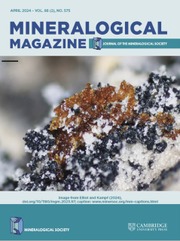Article contents
Ba-, Si- and vacancy-rich phlogopites from the talc-bearing sulfide ore deposit of La Creuse, Beaujolais, France
Published online by Cambridge University Press: 02 July 2018
Abstract
Ba-rich and Si-rich phlogopites occur in the talc-bearing rocks of the La Creuse sulfide ore deposit in Beaujolais, France. They form a group of compositions completely separated from the common Al-rich phlogopites that occur in the surrounding talc-free metasiltites and metarhyolites, with higher Ba and Mg and lower Al contents. The Ba-rich phlogopites have a relatively narrow compositional range (0.24 to 0.80 Ba per formula unit, for 44 valencies) with high and constant Si (5.8 atoms per formula unit, apfu) and Mg + Fe (5.6 apfu), probably buffered by the presence of talc. Compared to low-Al phlogopites from talc-free rocks, the excess charge introduced by the BaK–1 substitution is compensated by interlayer vacancies. Such a high level of interlayer vacancy (0.56 pfu), related to the talc-producing metasomatic conditions, is essential for the stability of this special group of Ba-rich and Si-rich phlogopites.
Single crystal X-ray diffraction analyses were performed. Ba-rich and Si-rich phlogopite is monoclinic, space group C2/m, (R = 5.31%) with a = 5.3185(5), b = 9.2136(9), c = 10.1349(11) Å and β = 100.131(11)°. The occupancies of Mg/Fe and K/Ba were refined exploring different vacancies. The solutions giving the best R factor (4.77%) and goodness-of-fit (1.06) are obtained with 15% < vacancy < 40% at the interlayer site.
Keywords
- Type
- Article
- Information
- Copyright
- Copyright © Mineralogical Society of Great Britain and Ireland 2018
Footnotes
Deceased
Associate Editor: G. Diego Gatta
References
- 1
- Cited by


